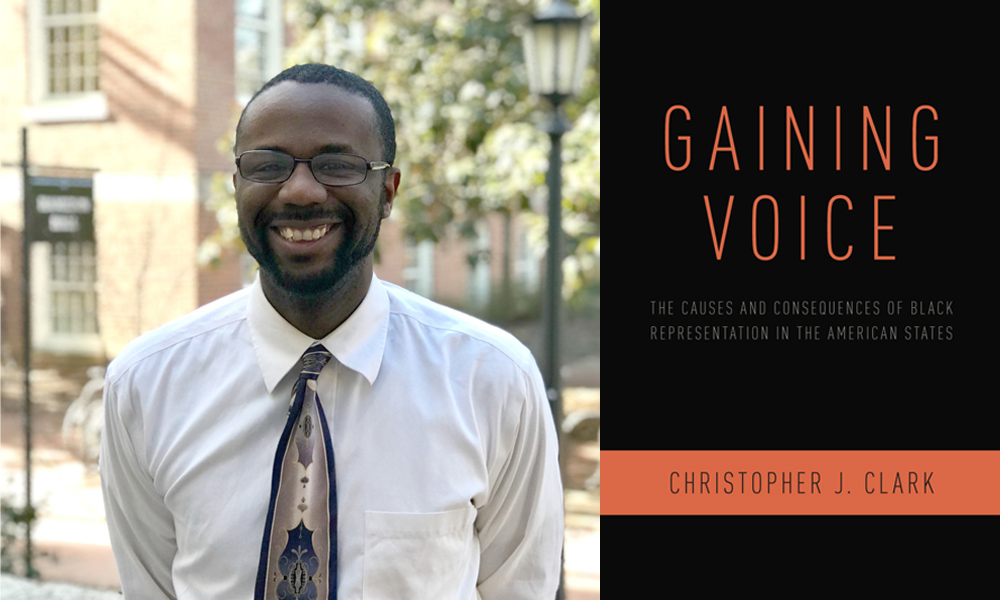 Bookmark This is a feature that highlights new books by College of Arts & Sciences faculty and alumni, published the first week of each month.
Bookmark This is a feature that highlights new books by College of Arts & Sciences faculty and alumni, published the first week of each month.
 Featured book: Gaining Voice: The Causes and Consequences of Black Representation in the American States (Oxford University Press) by Christopher J. Clark.
Featured book: Gaining Voice: The Causes and Consequences of Black Representation in the American States (Oxford University Press) by Christopher J. Clark.
Q: Can you give us a brief synopsis of your book?
A: My book is about how Blacks reach elected office and the implications of their presence in those positions of power. My book provides a multifaceted approach to the study of Black representation, with a focus on state legislatures. Whereas many studies examine individual Black elected officials, such as mayors or members of Congress, my book looks at the overall presence of Black state legislators, the extent to which the Black presence in the legislature reflects the Black population share in the state, and the presence of state legislative Black caucuses. I find that Black state legislators help us understand welfare and education policy, Black voter turnout and Black attitudes towards voter ID laws.
Q: How does this fit in with your research interests and passions?
A: I consider myself a person who specializes in the intersection of identity politics and state politics, so my book fits exactly with my research interests. Moreover, as an African American, I have at times been the only Black person in the room, and many times am one of a handful of Black people in a given space. As a result, I have long grappled with the consequences of my presence, as well as how I was able to get to where I am.
Q: What was the original idea that made you think: “There’s a book here?”
A: I wrote a dissertation that was in the form of a book, but I don’t think it was until I was a post-doc that I was convinced that I had research that could be turned into a book. My graduate school adviser and other mentors recognized that I had a book before I did, and I am grateful for their wisdom and support.
Q: What surprised you when researching/writing this book?
A: A lot of things! That said, I will focus on two. First, the first Black state legislator was elected in 1836, serving in Vermont, but it was not until 1938 that the first Black woman was elected to serve as a state legislator. I was really surprised by the amount of time separating these two events, and the gap reinforced how much gender matters for understanding Black politics.
I was also surprised to find that having a larger presence of Blacks in states where Democrats hold the majority of legislative seats is associated with less liberal welfare policy. For instance, if Blacks comprise 20 percent of the legislature in one state, but only 10 percent of the legislature in another state, then the state with the larger Black seat share would be expected to have Temporary Assistance for Needy Families (TANF) monthly cash benefits that are about $48 less generous. I like using cash benefits as an example because money is something that we easily understand, whereas other aspects of TANF policy are more esoteric. That is all to say that I was surprised to find evidence of backlash in the face of increased Black representation in state legislatures controlled by Democrats, given that Blacks have long been strong supporters of the party and thus might be expected to have better representation when the party holds more state legislative seats.
Q: Where’s your go-to writing spot, and how do you deal with writer’s block?
A: When on campus I love the Arboretum, especially since it is a five-minute walk from my office and a serene spot. I also like writing in my office since my books are there, allowing me to look up references. I don’t really have a writing spot at home, though I am known to scribble notes on sheets of paper or to open my computer to jot down my thoughts, something that I am certain annoys my family.
As for writer’s block, I try to write my first draft with as little judgment as possible, and I then significantly edit subsequent drafts. I also try to write a little over a long period of time, which helps because it allows my ideas to remain flowing, making it less likely that I get stuck. On the days when I am struggling to write, I try to be gentle with myself and then move on to other aspects of the research, such as data analysis or ensuring that I have accurate information for the studies I cite.
Clark is associate professor in the department of political science. His research interests include race and electoral representation in the United States, and state politics and policy. His book, Gaining Voice, was part of a special collection of featured titles under the theme “Democracy, Difference and Destabilization” at the 2020 American Political Science Association annual meeting.
Nominate a book we should feature by emailing college-news@unc.edu. Find some great books to add to your reading list by checking out our College books page.
